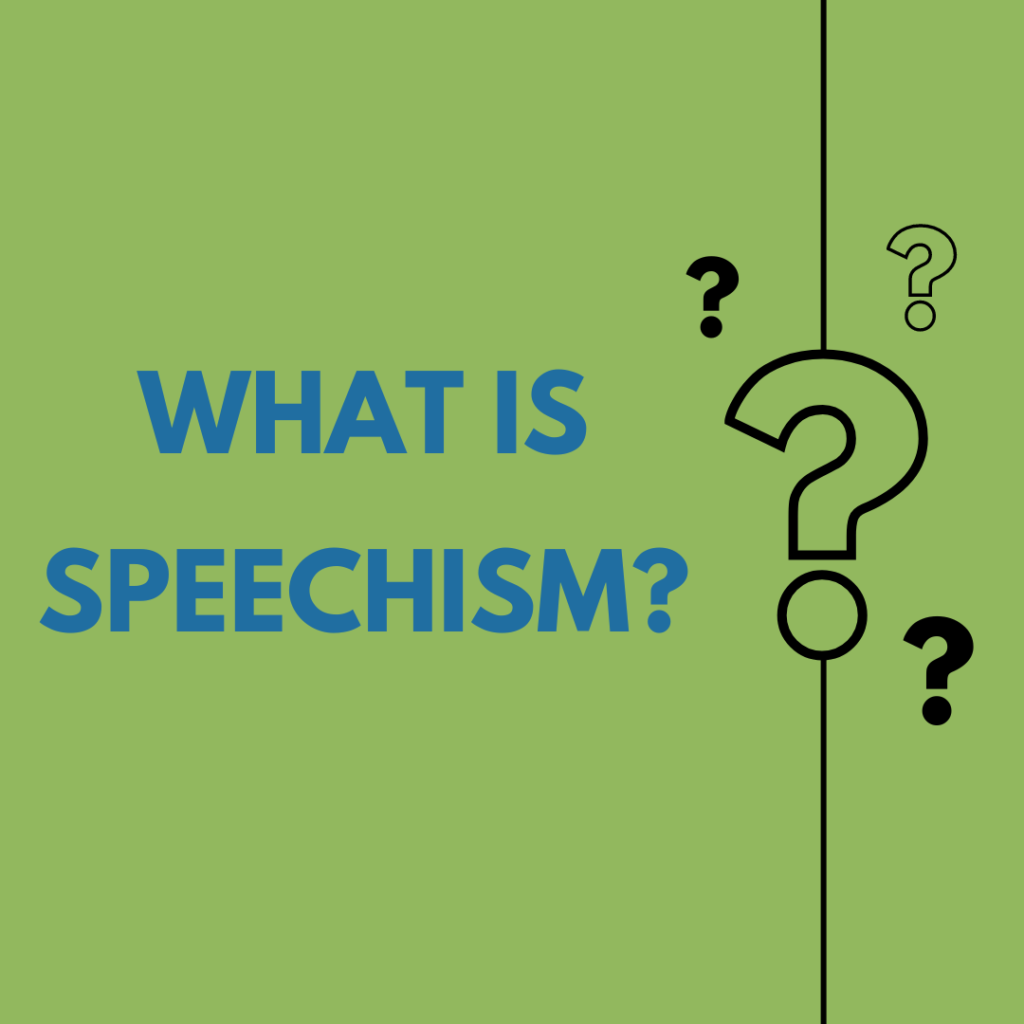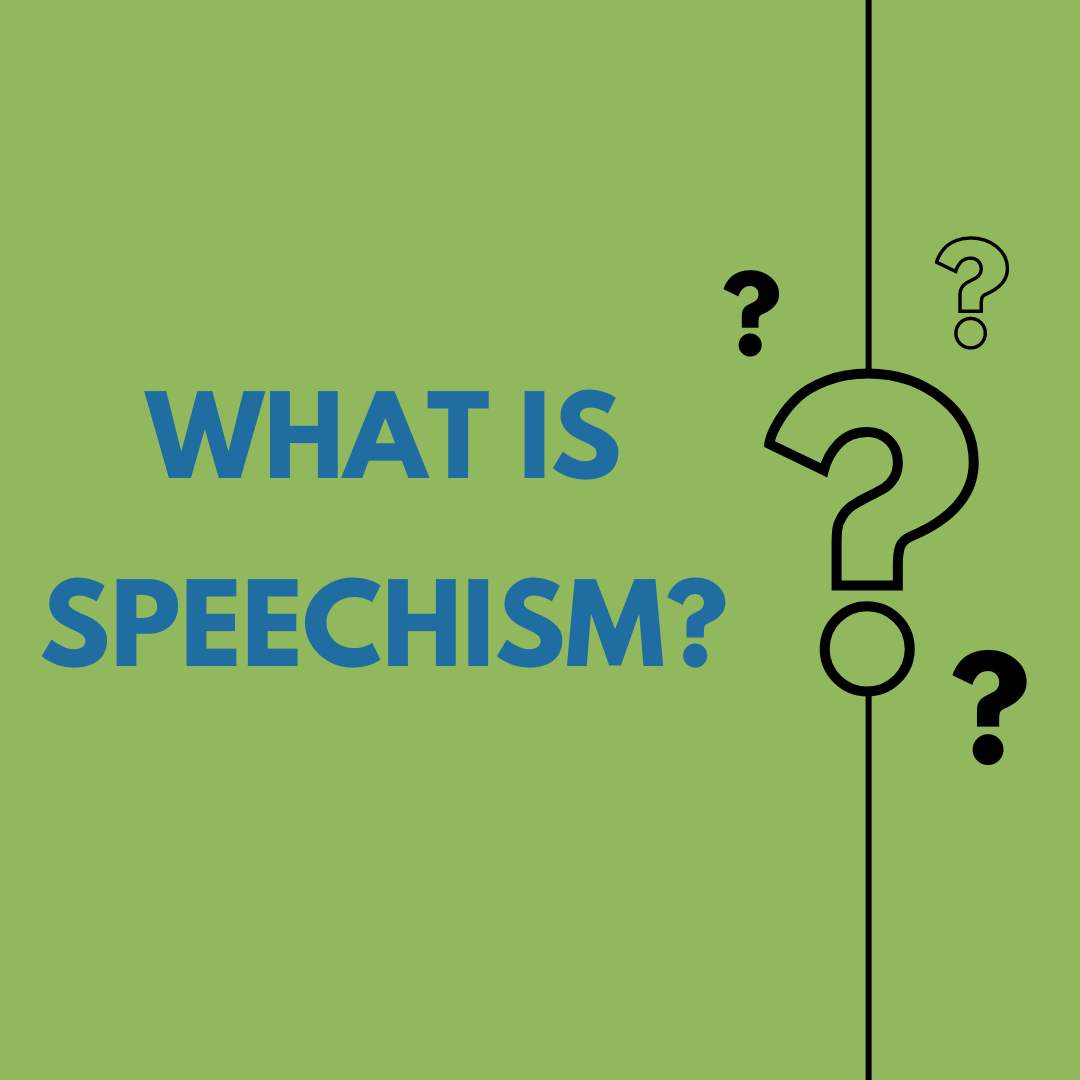A Working Definition and Request for Input

For centuries, people with significant speech disabilities have been treated as if we should not be seen or heard. Our ability, right, and basic need to express ourselves have been routinely overlooked and denied. Our words have been questioned because we do not use “typical” oral speech to express ourselves. We are discriminated against because others cannot—or refuse to—understand us. We are also often denied the tools, resources, and supports we need to communicate and have our voices heard.
As a result, we are still too often deemed “unable” to belong or contribute to our communities. Like other people with disabilities, we can often experience multiple forms of oppression, including racism, ableism, ageism, audism, classism, nativism, sexism, homophobia, and transphobia. This blog describes another form of bias and oppression that people who need augmentative and alternative communication (AAC) face daily—speechism.
In its broadest sense, speechism is prejudice and discrimination based on how, as well as whether, someone uses oral speech to express themselves. In other words, speechism unfairly privileges the use of certain oral language over all other methods of expression. This is something we believe AAC users and those who need but are denied access to AAC contend with continually. But we are not the only ones.
This form of injustice and discrimination intersects with other issues people in the United States face on a daily basis: being treated unfairly based on the language we use, the way we use language, and how we express ourselves. CommunicationFIRST believes that the words we use hold great power. We believe that it is essential to name the oppression we face in order to achieve the justice we seek. It can help spark much-needed discussion, and help identify ways we can forge alliances with individuals and organizations battling against the same bigotry. This is why we are proposing and asking for your reactions and help in shaping the following working definition of speechism.
What is speechism? Our working definition:
Speechism is prejudice and discrimination that occurs when a person or a group is discriminated against, stigmatized, treated unfairly and/or deemed inferior because their language, use of language, and/or means of expression is judged to be “unintelligible” or “inferior.”
Speechism can occur based on a person’s race, disability, ethnicity, primary language, use or non-use of spoken language, accent, preferred means of expression, or other factors. Speechism happens when someone’s use and understanding of language is derisively viewed due to being “foreign,” impossible to understand, or completely absent. Factors such as accent, vocabulary, syntax, style, rhythm and flow, or type of speech, such as oral speech versus synthesized or signed speech, can also come into play.
A little history worth knowing
For nearly a century, the use of American Sign Language (ASL) was banned throughout the United States. ASL was denounced as inferior and D/deaf children and adults were forced to try to only speak orally. This practice was called oralism, and led to widespread oppression and discrimination based on audism, prejudice or discrimination based on the belief that being deaf or hard of hearing makes a person inferior to someone with typical hearing. Learn more about oralism at Gallaudet University’s online exhibit. (Click through the exhibit pages to read the full story!)
Throughout our country’s history, Native people, immigrants, and others have faced similar biases, discrimination, and laws meant to make them abandon their languages and to speak and write in English only. For example, indigenous people forced to attend residential schools were punished, abused, and tortured for speaking their people’s language. Learn why indigenous language preservation is so important from The Indigenous Foundation. And read more about residential schools in this series from the Pulitzer Center. Moreover, it was not until the 1970s that the U.S. Supreme Court ruled that non-English students had the right to receive an equal education, including bilingual instruction. Learn more about the history of bilingual education in the U.S. and the importance of multilingual AAC access from this article.
It was only when these communities organized to call for an end to this injustice that things began to change for the better.
How is speechism similar to or different from related terms like audism, linguisticism, and language discrimination?
We view and use the term speechism as an umbrella term for all forms of discrimination against the way one expresses themselves. By doing this, we hope to explore and highlight the ways in which this oppression exacts a disastrous toll on people who require robust language-based AAC and many others, as well as ways we must work together to eliminate it.
Oftentimes, terms are coined to specify, exclude, and/or categorize. By using the term “speechism,” we want instead to bring concepts together as a way to highlight the interconnected struggle we face. We hope to show how speechism poses a dire threat to millions of people’s human and civil rights that can be used to mobilize and foster broad alliances across various communities. People requiring AAC and with other speech disabilities, D/deaf and hard of hearing people, DeafBlind people, non-English users, immigrants, indigenous people, users of African-American English and other forms of English, and anyone else facing injustice based on the way they communicate, can and must come together to fight speechism and build a world in which all forms of communication are respected and valued equally.
Do we really need another -ism?
Speechism is a powerful and largely ignored form of discrimination that disparages and harms millions of us every day. By giving it a name, everyone who experiences it can come together as allies, and begin to challenge it.
To address speechism, we need your help!
Please click here (or email info@communicationfirst.org) to let us know what you think of this working definition. Share whether and how you believe speechism affects you. What do you believe should be done to combat it? What do you think a world without speechism would look like?
We will use your feedback to refine our definition and move forward in the fight for communication rights for all. We plan to share a summary of the feedback we receive as well as additional resources on this topic in the coming months.

